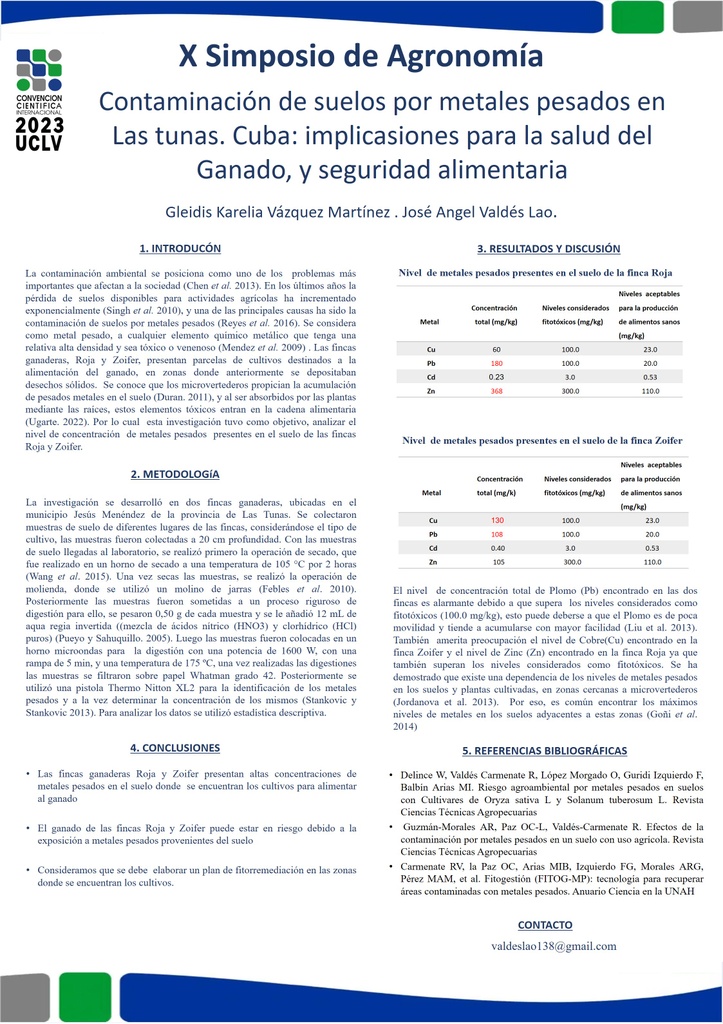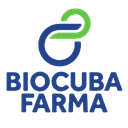Executive Secretary

IX Conferencia Científica Internacional sobre Desarrollo Agropecuario y Sostenibilidad
X Simposio de Agronomía

Resumen
En Cuba, la contaminación de los suelos por metales pesados figura entre los principales problemas ambientales, ya que a pesar de que estos elementos se encuentran de manera natural en el medio, las altas concentraciones limitan o restringe el uso de los suelos para la agricultura. Las fincas ganaderas, Roja, El Litoral y Zoifer, presentan parcelas de cultivos destinados a la alimentación del ganado, en zonas donde anteriormente se depositaban desechos sólidos. Se conoce que los microvertederos propician la acumulación de metales pesados en el suelo, y al ser absorbidos por las plantas mediante las raíces, estos elementos tóxicos entran en la cadena alimentaria. Por lo cual el objetivo de esta investigación fue, analizar el nivel de concentración de metales pesados presentes en el suelo de las fincas Roja, El Litoral y Zoifer. Para la recolección y tratamiento de muestras de suelo, estas fueron tomadas a 30 cm de profundidad, aplicándose el método de zigzag. Posteriormente las muestras fueron sometidas a un proceso riguroso de digestión previa al análisis. Luego para el análisis de las muestras se utilizó el método de la espectrometría de emisión óptica de plasma acoplado. En los suelos de las fincas Roja y Zoifer se detectaron altas concentraciones de metales pesados, mientras que en la finca el Litoral fueron bajas. Los resultados indican que el ganado de las fincas Roja y Zoifer se encuentra en riesgo, por lo que es necesario aplicar un plan de fitorremediación en las zonas donde se encuentran los cultivos.
Abstract
In Cuba, the contamination of soils by heavy metals is one of the main environmental problems, since despite the fact that these elements are naturally found in the environment, high concentrations limit or restrict the use of soils for agriculture. The livestock farms, Roja, El Litoral and Zoifer, have plots of crops intended for livestock feed, in areas where solid waste was previously deposited. It is known that micro-landfills promote the accumulation of heavy metals in the soil, and when they are absorbed by plants through the roots, these toxic elements enter the food chain. Therefore, the objective of this research was to analyze the level of concentration of heavy metals present in the soil of the Roja, El Litoral and Zoifer farms. For the collection and treatment of soil samples, these were taken at a depth of 30 cm, applying the zigzag method. Subsequently, the samples were subjected to a rigorous digestion process prior to analysis. Then, the coupled plasma optical emission spectrometry method was used for the analysis of the samples. High concentrations of heavy metals were detected in the soils of the Roja and Zoifer farms, while they were low in the El Litoral farm. The results indicate that the cattle of the Roja and Zoifer farms are at risk, so it is necessary to apply a phytoremediation plan in the areas where the crops are located.
Sobre el ponente

José Angel Valdés Lao

Discussion

